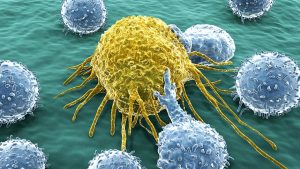Scientists at the Centre for Cancer Immunology are to begin a new study to better understand why certain natural killer T cells are more effective against cancer than others.

In pre-clinical studies, Invariant Natural Killer T (iNKT) cells have been shown to fight cancer as well as stimulate an anti-cancer reaction in the body. However, translation into human cancer patient trials has been less successful.
Funded by a pump priming grant from the Southampton Enterprise Fund, this new study aims to identify which type of iNKT cell can be used to efficiently kill tumour cells.
The team will be led by Dr Salah Mansour and Dr Ali Roghanian .
Dr Mansour commented: ŌĆ£This study builds on previous work from our group , demonstrating that certain iNKT cells are more effective against tumour cells than others. We believe that previous iNKT-based approaches have been less successful partly because iNKT cells are defective in cancer patients but also because those studies have not exploited more potent iNKT cell subsets that have a greater tendency to kill tumour cells. We are very excited to continue developing this translational project and hope to be able to demonstrate the efficacy of these cells in bespoke pre-clinical models of cancer developed at SouthamptonŌĆØ
The scientists hope this novel strategy can be used to develop future off-the-shelf adoptive cellular therapies against various cancers, including CAR-iNKT cells against solid tumours.
Pump priming funding provides vital support to researchers who have early concept ideas that need further investigation before more substantive funding from external sources can be secured.